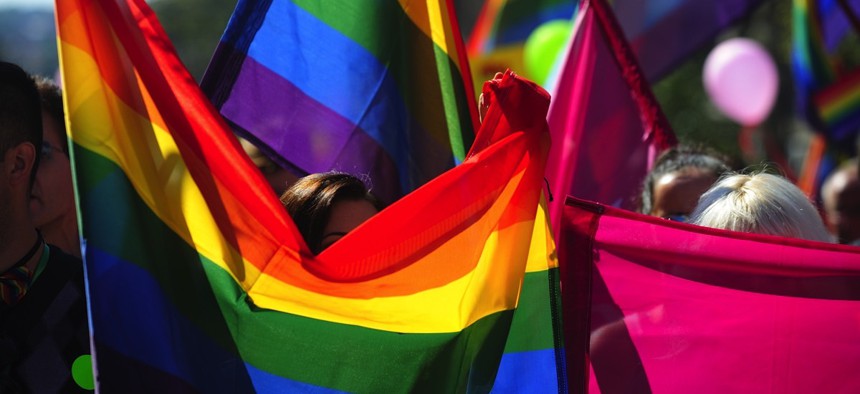Why Same-Sex Marriage Bans Risk Native American Sovereignty

When tribes don’t allow gay couples to marry their chosen partners, they invite negative perceptions about their unique legal status.
Cleo Pablo and her wife Tara Roy-Pablo were married under Arizona law in 2015. But Pablo’s tribe, the Ak-Chin Indian Community, refused to recognize their union.
Cleo Pablo felt obligated to leave. “I want equal opportunity,” she said, “I want what every married couple has.” Pablo also filed a lawsuit against the Ak-Chin Indian Community, though it is still pending.
They’re hardly alone. More than a year after the U.S. Supreme Court declared same-sex marriage bans unconstitutional, thousands of same-sex couples remain unable to marry their chosen partners.
Couples that live on American Indian reservations are beyond the reach of constitutional protections because of the unique legal status of Native American tribes. American Indians have fought to retain sovereignty over their tribal lands and to preserve their right to make—and enforce—their own laws in their own justice systems. Tribal governments are therefore allowed to continue to ban same-sex marriage despite the Court’s ruling. But not all tribes are against same-sex marriage. In 2011, Suquamish tribal member Heather Purser asked the tribe to vote on same-sex marriage recognition, and was surprised and delighted when her request passed. “I wanted to feel accepted by my tribe,” Purser said. “I was expecting a fight to be ugly. But I was so shocked. I guess I was expecting the worst out of people. I was expecting the worst out of my people.”
Still, tribal sovereignty remains precarious. Same-sex marriage bans are costly, not only for couples, but for the tribes who impose them. The longer they remain in place, the higher the likelihood that they will negatively impact perceptions of tribes and tribal justice. Historically, when tribal and Anglo-American values were in conflict, non-Indians tended to disparage tribal values as backwards, inferior, and unjust. These instances put tribal sovereignty at risk, as evidenced by recent cases.
Take Santa Clara Pueblo v. Martinez, which concerned a rule that permitted male tribal members to pass their tribal membership on to their children, regardless of the mother’s eligibility, but denied a reciprocal right to the Pueblo’s female members. Julia Martinez, a member of the Santa Clara Pueblo, challenged the rule as an equal protection violation. In considering the case, the Court weighed Martinez’s individual right to be free of discrimination against the Pueblo’s interest in controlling their membership. The Court ruled for the Pueblo and upheld the tribe’s right to choose its own membership criteria. The decision reaffirmed that equal protection challenges to tribal decisions must be evaluated against the background of tribal sovereignty.
But the case also revealed the conflict between women’s rights and tribal rights. Prominent civil-rights advocates, including Ruth Bader Ginsburg and Catharine MacKinnon, conceded the price of preserving Indian rights was too high. MacKinnon wrote in her book, Feminism Unmodified, that such gender inequality indicates “that the tribe has a problem—and not a problem to be solved by punishing Native women through their children.” Similarly, in describing Ginsburg’s reaction to the case, ACLU attorney Alvin Ziontz recalled: “[F]or her the equal protection issue clearly trumped any tribal interest. She was unyielding… showing little understanding or sympathy for tribal values.”
Underlying tensions between Indian rights and civil rights were also exposed during the Cherokee Freedmen cases. Those cases, which are still ongoing, involve the Cherokee Freedmen, descendants of former Cherokee slaves. In 1866, a treaty between the Cherokee Nation and the United States freed these men and women, and granted them the rights and privileges of Cherokee citizenship. Despite the agreement, the Freedmen were routinely and systematically excluded from participation in tribal affairs. In 2007, the Cherokee Nation passed a constitutional amendment effectively eliminating tribal membership for the Freedmen, arguing that, as a sovereign nation, they had the right to define their membership and to do so in accordance with traditional Cherokee values that emphasized the importance of ancestry and clan.
The Cherokee’s disenfranchisement decision was widely viewed as an appalling civil-rights violation. It prompted the Bureau of Indian Affairs to question the Cherokee Nation’s fitness to govern. The BIA also threatened to find the Cherokee election, which had led to the referendum, unconstitutional, indicating that it would be willing to refuse to recognize the legitimacy of the Cherokee government. The U.S. Department of Housing and Urban Development also froze $33 million of housing funds, which they stated would only be restored to the tribe once “the [Freedmen] issue is resolved.” Congresswoman Diane Watson introduced a bill that “would cut all federal funding to the tribe, estimated to be $300 million annually, and suspend its authority to conduct gaming operations until the tribe restores full citizenship to the black Cherokees.” The tribe eventually backed down and reinstated the Freedmen, although their ultimate fate remains unclear.
The federal government’s decision to intervene is not unprecedented. In fact, it has done so before to limit Indian sovereignty in response to perceived conflicts between Indian and non-Indian customs and traditions. Recently, amendments to the Violence Against Women Act have given tribes the opportunity to reassert authority in cases relating to domestic violence, but only if they can demonstrate the fairness of tribal justice. In most cases, this means that tribes must show that their laws and justice systems closely mimic those of state courts.
Advocates hope these “state-like” protections will allay concerns regarding Indian justice. But same-sex marriage bans seemingly undermine these efforts. When tribes choose Indian rights over civil rights, they run the risk of being labeled unjust. In many instances, the protection of tribal customs and traditions may warrant this risk. The question is whether same-sex marriage bans fall into this category.
Marcia Zug is an associate professor of law at the University of South Carolina. This article was originally published by The Atlantic.
NEXT STORY: Democrats and Republicans Are Miles Apart on Yet Another Issue: Public Lands





